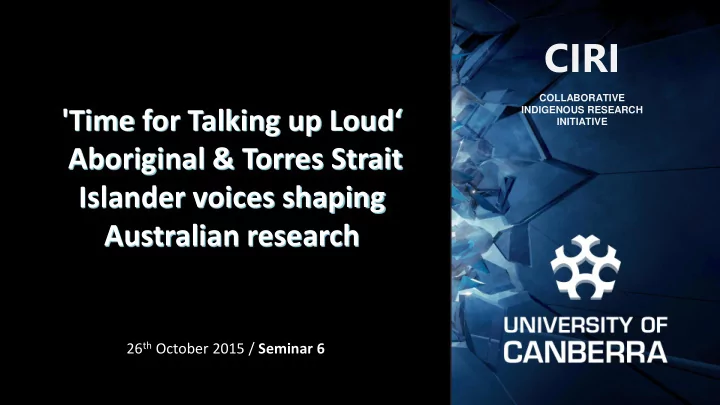

CIRI COLLABORATIVE INDIGENOUS RESEARCH 'Time for Talking up Loud‘ INITIATIVE Aboriginal & Torres Strait Islander voices shaping Australian research 26 th October 2015 / Seminar 6
Acknowledgement of Country and People “I wish to acknowledge the Ngunnawal people as the traditional owners and custodians of land on which we meet today"
Cultural Protocol There is no single Aboriginal culture, Torres Strait Islanders are a separate Aboriginal society is very diverse, and people with their own distinct identity dynamic. and cultural traditions.
Nations within a Nation
Cultural Protocol
Who am I ? - Lynore K. Geia My Naming – Voice in a name Bwgcolman Woman - Palm Island, Qld; Mother, Community Leader, Teacher, Mentor, Storyteller; Nurse, Midwife, Academic & Researcher; Formative Influence - social justice work of parents and others; Personal conviction of social & restorative justice; Vision of emancipation; Recognising strength and building into peoples’ lives through relationships;
‘ Talking up loud ’ is a Murri colloquialism, ‘raising our voice, getting heard’, and broaching the issues in places where Aboriginal and Torres Strait Islander peoples’ voices were deemed vox nullius in the past.
Research - vox nullius in the past Eurocentric methods of research have been instrumental in shaping the history and service provision for Palm Island and other communities from early settlement years. Palm Island challenges the orthodoxy of Australian and Queensland governments and sectors of society at large.
Research - vox nullius in the past Figure 2: Extract of Tindale’s genealogy field notes on Geia family; Tindale notes Thomas Geia (author’s father) as ¼ caste and Torres Strait Island (circa 1938)
A man [sic] is always a teller of stories, he lives surrounded by his own stories and those of other people, he sees everything that happens to him in terms of those stories… (Sartre, quoted in Bruner 1987, p.21) Riessman (1993) cautions us, as qualitative researchers, that we cannot give voice but we do hear voices that can be recorded and interpreted for a wider audience.
Principles of Indigenous Research – global paradigm New Knowledge - Aboriginal &/or Torres Strait Island Research Knowledge Generation; Decolonisation – challenge master narrative of Australian hegemony; Emancipation – breaking free to form Aboriginal epistemology, ontology; Resistance; Political integrity; Privileging the voice of Aboriginal & Torres Strait Islander peoples; (Rigney, 1999, Tuhiwai Smith, 2005 )
World View Perspective - Non linear Temporality of place, space, and time
Research Framework National Health & Medical Research Council Research Guidelines University Human Ethics Research Committee; Community Leadership – Community Council, Eldership or Nominated Community Leader or Voice of Advocacy; Community Members - family relationships; Situating the Self.
Research Standpoint – Relationship Informed through relationship identity of researcher; Lived experience, belief systems; World view perspective, politics; Empowerment of voice; Community vision & aspirations; Meaningful process, Murri Way;
Researching with Aboriginal & Torres Strait Islander people Values and Ethics in Aboriginal & Torres Strait Islander Health Research Guidelines 2003; Reciprocity - equitable benefits to community Respect - respectful research relationships Equality - right to be different, distributive fairness and justice Responsibility - responsibility to do no harm , transparent accountability Survival & Protection - importance of collective identity , no discrimination Spirit and Integrity - community decision making, shared values, relationality
Talking Up Loud – Also Listening Listen with ears, as well as the spirit; Don’t be Gamin, Binagarri; Relationship – hearing the voice in the silence.
Indigenous Research Outcomes Community – Meaningful research, outcomes, change, leadership, knowledge generation and knowledge transfer, and community capacity building based on strengths. Academia – Recognition and acceptance as scholarly research Research knowledge generation and transfer Ethical integrity, advocacy and social justice Research education – enrichment in diversity Policy - Decolonising policy, accountability of government workers to community, working with community not imposing on community
Recommendation 4: Establishment of a designated space in research centres for Indigenous epistemology and formal representation to major funding bodies that this is a legitimate, significant and essential approach to answer long standing and traditionally ignored Indigenous research questions.
Recommendation 6: Inclusion of the principles of the proposed radical new paradigm in both the theory and practice education curriculum for all professionals involved in service delivery to Australian Indigenous people.
Supporting Existing Aboriginal & Torres Strait Island Research Organisations
Thank You Decolonise thinking, research, practice, and policy; Listen, respect, privilege Aboriginal & Torres Strait Islander voices; Work with us !
Recommend
More recommend